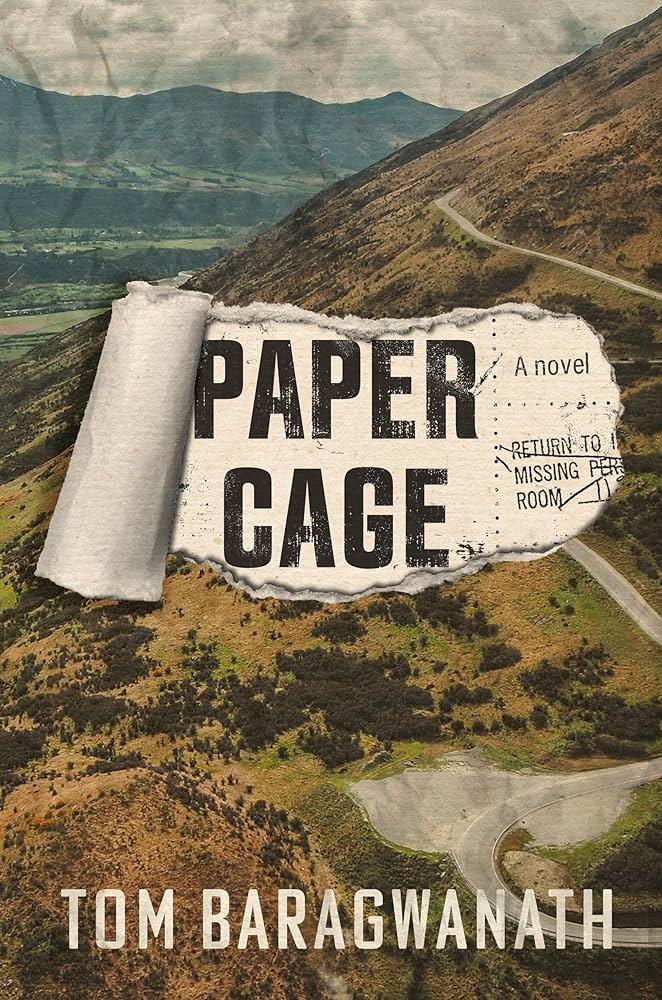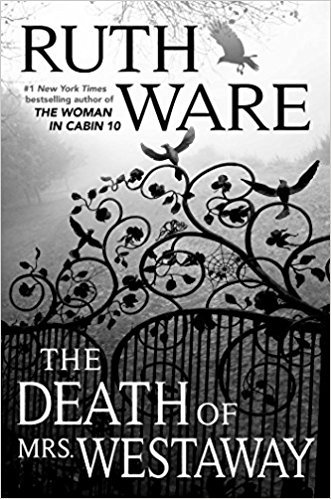From the Stacks III: Baragwanath, Cheng , Montague, Ware, McCann
Time for more novels from my book cache. I’ve got so many new and old ones that it’s a tossup which will happen first, a collapse of my shelves or the need to buy more memory for my iPad Kindle reader. I’m thinking of changing my name to Stack-o-lee.
Tom Baragwanath is a New Zealand novelist whose debut novel Paper Cage (Knopf, 2024, 314 pp.) is set near the farming village of Masterton, NZ, where he grew up. Lorraine Henry is a records clerk for the local police. That’s not a post that gives her a lot of street cred, but when kids begin to disappear, she grows suspicious about the half-hearted police attempts to find them. That couldn’t have anything to do with the fact that the kids are Māori, could it? When her Māori nephew Bradley Mākara disappears as well, Lorraine has her answer. Not that it gives her more influence, as Bradley’s father is a known drug runner and gang member. Lorraine’s effort to save disappeared children involves making inroads into a rough Māori community, working with a detective, and trusting people who she’s not sure she should trust. It’s a tense novel, even when it’s not as coherent or as logical as it should be. ★★★
Can a rabbit teach a family what really matters? It does in The Burrow (Tin House, 2024, 187 pp.), a short novel from Australian writer/doctor Melanie Cheng. Jin and Amy Lee are workaholic parents to 10-year-old Lucie in the waning days of Melbourne’s COVID restrictions. Lockdown, a first child who died, Amy’s stasis, and Jin juggling an affair don’t make for a happy household . Nor do stay-overs by Amy’s mother Pauline, who loves Lucie but is estranged from both Amy and Jin. So how does adopting a bunny help? Pauline reads Watership Down with Lucie, who promptly names her rabbit Fiver. Rabbits are not always a good pet; as several characters note, they are nervous because they are “prey animals.” The Burrow is, at times, a charming novel, but it is not a children’s book. It’s about what it means to care for people and animals, how to cope with fear, and how to get centered. ★★★★
How Does That Make You Feel, Magda Eklund (Ecco, 2024, 241 pp.) might sound like a title from Fredrik Backman, but it’s a new novel from Anna Montague about a psychologist who happens to have Scandinavian ancestry. Magda is the oldest member of her practice, but has devoted colleagues who’d do anything for her. She suffers from anthropophobia (social anxiety) and lives an intellectual but insular life. She seldom ventures out for drinks with her office mates and been known to duck out of parties in her honor. Luckily she has Sara, the kind of friend who can finish her sentences, badger her to leave her New York apartment, and convince Magda to agree to a secret plan to celebrate her upcoming 70th birthday. When Sara suddenly dies, Magda’s mourning becomes depression and a burden to bear. She’s never been fond of Sara’s husband, who tasks her with dealing with Sara’s ashes. Plus, Magda discovers that Sara had a road trip planned for the two of them that Magda feels honor-bound to take. Along the way she discovers her true identity. It is often said that psychologists are among the most screwed up people in the world. I don’t agree and think it’s a cheap trick to make Magda so self-unaware, but the novel has keen insights into friendship and grieving. ★★★
Ruth Ware is considered a star among twisty mystery/thriller writers. The Death of Mrs. Westaway (Scout Press, 2018, 368 pp.) has a delightful old-fashioned feel to it. That’s by design; Ware admits her love of Agatha Christie and wrote Mrs. Westaway in Christie’s style. Harriet “Hal” Westaway works as a Tarot card reader on a Penzance pier, but has bills she can’t pay, including the rental on her booth. The owner of the latter sends a thug to break a few things and promises she’s next unless she coughs up the dough. Hal has no way to do that, but smells opportunity when a letter informs her that she has inherited money and an estate house from her grandmother. Hal knows she’s the wrong Westaway but cooks up a plan to go to the estate in Cornwall to bilk the rich and get out before she’s discovered. That’s the scheme, but what if she’s wrong? Do not think Cinderella tale. The Westaway family has issues, bickers like caged badgers, and divides into two camps over whether Hal is legit. Is money at the center of all? Too simple. This novel has it all: foul play, dark and stormy nights, long buried secrets, a threatening housekeeper, things that go bump in the night, and desperate flight. If you think an estate house sounds romantic, don’t! Ware’s book contains many unlikely Christie-like touches, but they are of the sort that make both writers enticing. ★★★★
If you’ve never read Let the Great World Spin (Random House, 2009, 350 pp.), you should. It’s a complex book that is poetic, non-linear, and told from the perspective of 11 separate characters, but it’s an extraordinary piece of literature for which author Colm McCann rightly won a National Book Award. The title comes from Tennyson. It’s next lines are, “We stumble on. It is enough.” McCann leverages those sentiments in a novel about vulnerability and the fragility of life. Interspersed within the narrative are metaphors posing as descriptions of Philippe Petit’s 1974 walk between the two towers of the World Trade Center. Two Irish brothers, Corrigan, a Jesuit street minister, and Ciaran are the novel’s fulcrum. Ciaran visits Corrigan in his Bronx apartment in the projects. Despite obvious dangers, Corrigan leaves his apartment unlocked when he’s at work at a nursing home so that the hookers can use the restroom or stay if they need rest or shelter. Ciaran is appalled by those “hanging on to (Corrigan) like he was some bright hallelujah in the shitbox of what the world really is.” McCann deftly intersects the lives of prostitutes, a judge, his wife, mothers who lost sons in Vietnam, an overweight African American woman, the blood disease TTP, and other voices and situations. The key secondary characters include street walkers Tillie and her daughter Jazzlyn, a mother of two. The fragility of life is reinforced in a hit-and-run accident that kills two key individuals and the affects upon survivors. In an epilogue, Ciaran revisits New York 32 years later (2006) that serves the great world spinning theme. A name change by Jazzlyn’s grown daughter is significant. Those who lived in or visited New York in the 1970s can attest to McCann’s observation of its Inferno-like decadence and how much it changed. I won’t tell you that this is an easy novel to digest, but I will say that you’ll know you’ve read a masterful work that invites pondering good, evil, naiveté, pessimism, consequences, hope, race, and injustice.
Rob Weir










